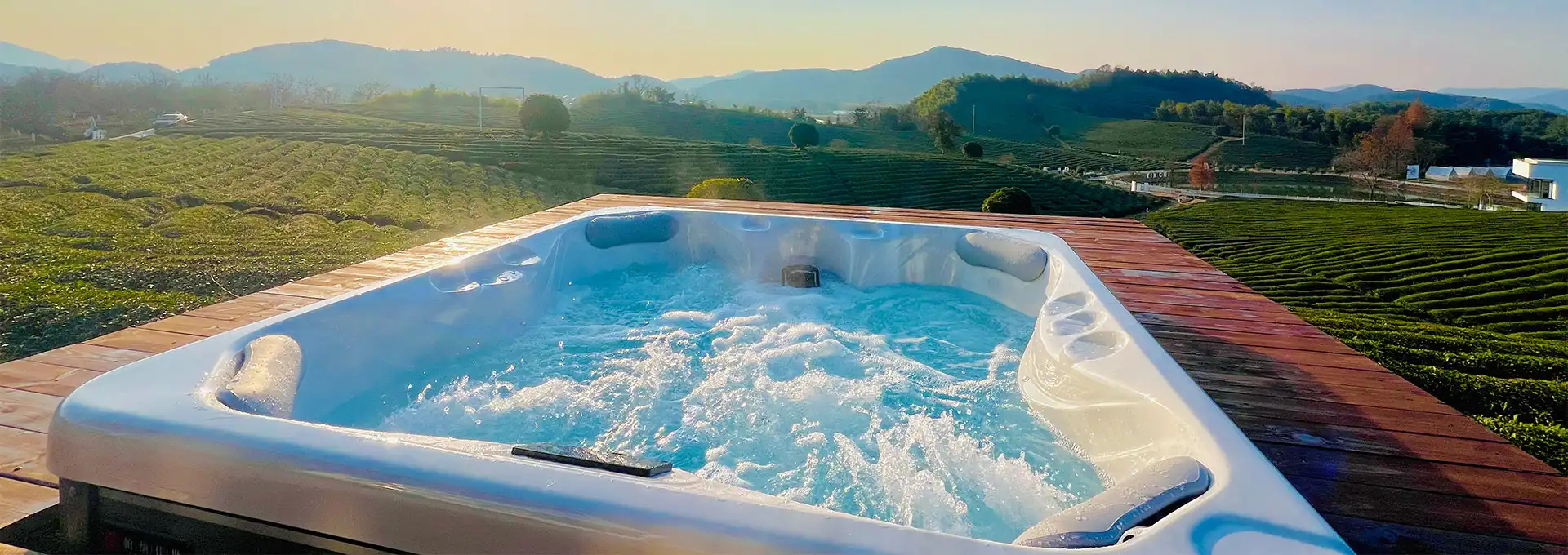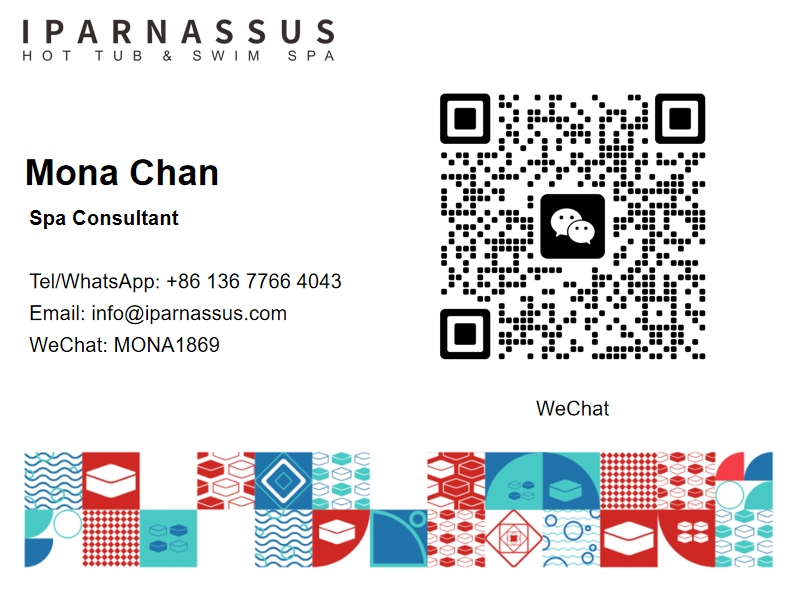How Do Smart Hot Tubs Meet the Unique Needs of Middle Eastern Hotels?
2024-12-19 16:56:48
The luxury hospitality sector in the Middle East is experiencing unprecedented growth and transformation, with hotels continuously seeking innovative solutions to enhance guest experiences while addressing regional challenges. Smart hot tubs have emerged as a groundbreaking solution that perfectly balances luxury amenities with technological advancement, providing Middle Eastern hotels with a competitive edge in the global hospitality market. These sophisticated systems represent more than just a relaxation feature; they embody the perfect synthesis of comfort, efficiency, and technological innovation that modern luxury establishments demand. The integration of smart technology in hot tubs has revolutionized how hotels approach guest comfort and operational efficiency, particularly in the unique climate and cultural context of the Middle East.
Shenzhen Iparnassus Intelligent Spas Co., LTD specializes in resort hot tubs and infinity pool spas. Our hot tubs are equipped with circulation filtration and sterilization systems, reducing the need for frequent water changes. With professional design, R&D, production, sales, and after-sales service teams, we have obtained more than 30 patents as of 2023. The iParnassus® brand business covers dozens of countries and regions globally. For Middle Eastern hotel centralized procurement cooperation plans: 1. Free mold customization support; 2. Free control system upgrade with hotel centralized management system; 3. Direct cooperation with top manufacturers, providing direct benefits to hotels; 4. North American materials and standards at competitive prices. We offer high-end quality products with reliable after-sales service, with products sold to more than 20 countries worldwide. Contact info@iparnassus.com for more information.
What Are the Water Management Challenges for Hotel Hot Tubs in the Middle East?
In the Middle Eastern hospitality sector, water management presents a complex set of challenges that smart hot tubs are uniquely positioned to address. The region's water scarcity issues, combined with the high mineral content often found in local water sources, create a demanding environment for traditional hot tub systems. Smart hot tubs have revolutionized this landscape by incorporating sophisticated multi-stage filtration systems that effectively manage these challenges while maintaining optimal water quality. These advanced systems employ a combination of physical filtration, chemical treatment, and intelligent monitoring to ensure that water remains clean and safe for extended periods, significantly reducing the frequency of water changes and the overall water consumption. The implementation of these technologies has demonstrated remarkable results, with some hotels reporting up to 40% reduction in water usage compared to conventional systems, while simultaneously maintaining superior water quality standards.
The sophisticated water conservation features integrated into modern smart hot tubs represent a significant advancement in sustainable luxury hospitality. These systems utilize artificial intelligence and machine learning algorithms to optimize water usage patterns, predicting and adjusting to varying demand levels throughout the day. The automated chemical balance monitoring system continuously analyzes water chemistry, making real-time adjustments to maintain optimal conditions without human intervention. This level of automation not only ensures consistent water quality but also prevents the common issues associated with manual chemical management, such as over-treatment or insufficient sanitization. The system's ability to maintain perfect chemical balance has proven particularly valuable in the Middle Eastern climate, where high temperatures can accelerate chemical degradation and affect water quality more rapidly than in cooler climates.
How Do Smart Control Systems Benefit Hotel Operations?
The implementation of smart control systems in hotel hot tubs has transformed the traditional approach to facility management, creating unprecedented levels of operational efficiency and cost-effectiveness. These sophisticated systems integrate seamlessly with existing hotel management platforms, providing a comprehensive solution for monitoring and controlling multiple hot tubs across the property. The centralized management dashboard enables staff to monitor critical parameters such as temperature, chemical levels, filter status, and energy consumption in real-time, all from a single location. This level of control has significantly reduced the man-hours required for routine maintenance and monitoring, allowing staff to focus on other aspects of guest service while ensuring that hot tub facilities remain in optimal condition at all times. Furthermore, the system's predictive maintenance capabilities have revolutionized the approach to equipment upkeep, using advanced algorithms to identify potential issues before they develop into problems that could affect guest experience or require costly repairs.
The energy optimization capabilities of smart hot tub systems have proven particularly valuable in the context of Middle Eastern hotels, where energy costs and environmental considerations are increasingly important factors in operational planning. These systems employ sophisticated algorithms that analyze historical usage patterns, weather conditions, and booking data to optimize heating schedules and energy consumption. During periods of low demand, the system automatically adjusts temperature and filtration settings to minimize energy usage while ensuring that facilities remain ready for guest use with minimal notice. This intelligent energy management has resulted in significant cost savings for hotels, with some properties reporting energy reduction of up to 30% compared to traditional hot tub systems. The ability to demonstrate such environmental consciousness while maintaining luxury standards has become increasingly important for hotels seeking to attract environmentally aware travelers without compromising on the quality of their amenities.
What Safety Features Do Smart Hot Tubs Offer for Hotel Guests?
The integration of advanced safety features in smart hot tubs represents a significant advancement in guest protection and risk management for hotel operations. Modern smart hot tub systems incorporate multiple layers of safety technology, beginning with sophisticated water sanitization systems that combine traditional chemical treatment with advanced UV-C light technology and ozone systems. This multi-barrier approach to water treatment has proven particularly effective in the warm Middle Eastern climate, where maintaining proper sanitization levels can be more challenging due to elevated ambient temperatures. The automated system continuously monitors and adjusts sanitization levels, ensuring that water remains safe for guest use while minimizing the risk of waterborne illnesses or skin irritations. These systems have demonstrated remarkable effectiveness, with some hotels reporting a significant reduction in water-quality-related guest complaints since implementing smart hot tub technology.
The comprehensive approach to guest safety extends beyond water quality management to include sophisticated monitoring and control systems that oversee every aspect of hot tub operation. Temperature control safeguards utilize multiple sensors and redundant systems to prevent overheating, automatically adjusting settings based on ambient temperature and usage patterns to maintain safe and comfortable conditions for guests. The integration of activity monitoring sensors provides an additional layer of safety, capable of detecting unusual movements or potential emergency situations and alerting staff immediately. This rapid response capability has proven invaluable in preventing incidents and ensuring guest safety, particularly during periods of high occupancy or when facilities are operating with reduced staff presence. The combination of these safety features has contributed to a marked improvement in guest confidence and satisfaction, with many hotels reporting increased usage rates and positive feedback regarding their hot tub facilities.
The financial implications of implementing smart hot tub systems in Middle Eastern hotels extend far beyond simple operational cost savings. These sophisticated systems contribute to overall property value enhancement, improved guest satisfaction ratings, and increased booking rates for rooms with access to these premium amenities. The reduction in maintenance costs, combined with lower water and energy consumption, has resulted in significant operational savings for hotels that have adopted this technology. Industry data suggests that properties with smart hot tub installations typically see a return on investment within 24-36 months, primarily through reduced operational costs and increased revenue from premium room rates. Additionally, the positive impact on guest satisfaction scores, often showing improvements of 25% or more, has translated into higher booking rates and increased guest loyalty, providing long-term financial benefits that extend well beyond the initial investment in smart technology.
For more information on hot tub installations and our products, please feel free to contact us at info@iparnassus.com.
References:
1. International Journal of Hospitality Management (2023). "Smart Technology Integration in Luxury Hotels"
2. Middle East Hospitality Report (2024). "Water Conservation in Hotel Operations"
3. Journal of Sustainable Tourism (2023). "Environmental Impact of Smart Hotel Amenities"
4. Hotel Management International (2024). "Technology Trends in Luxury Hospitality"
5. Water Management in Hospitality (2023). "Advanced Water Treatment Systems for Hotels"
Send Inquiry
Related Industry Knowledge
- Unlocking the Potential of Swim Spas for Weight Loss and Wellness
- How Long to Fill a Hot Tub?
- How Often to Drain a Hot Tub?
- How to Maintain an Outdoor Swim Spa?
- How Much to Build a Large Hot Tub?
- How Much Is a Swim Spa?
- Smart Features in Modern Outdoor Hot Tubs?
- How Often Should My Swim Spa Filter Run?
- How Do You Repair Temperature Controller on a Shower Spa?
- Do I Need New Spa Side Control?



